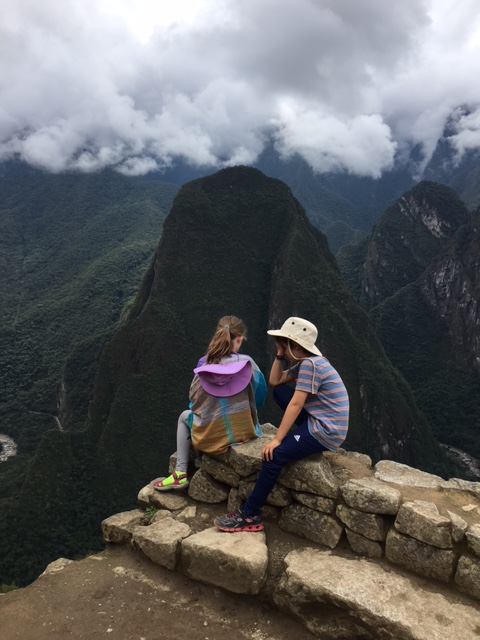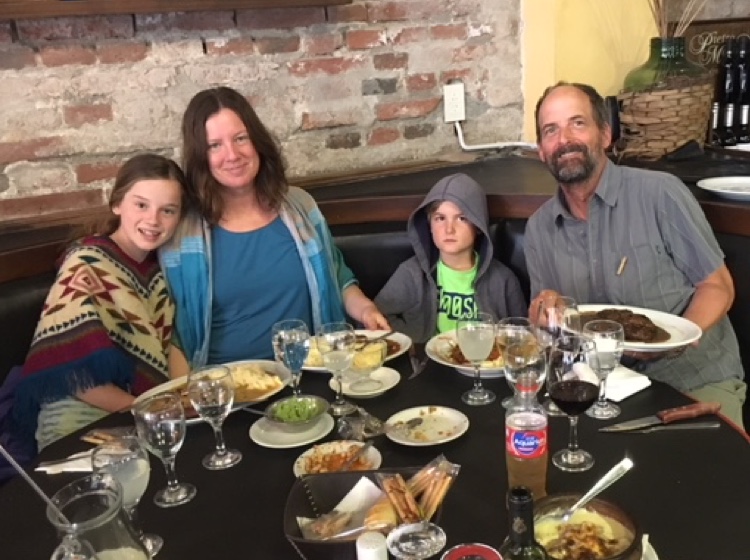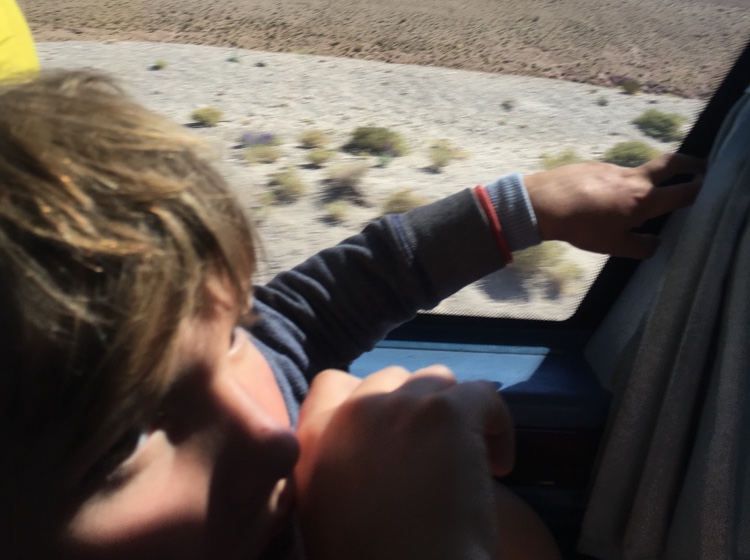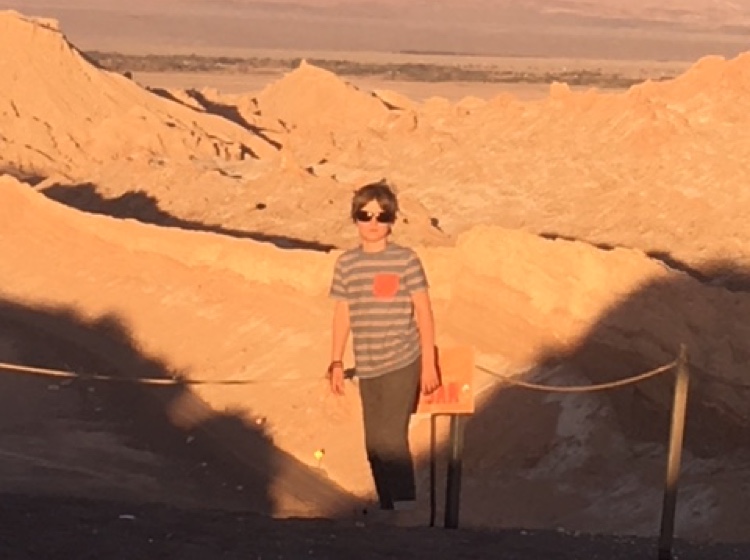“You want it quiet?!” The drunken Peruvian in the boxer shorts stood on the roof across from me. He held a bottle in one hand and gesticulated wildly with the other. “You want the music QUIET?!”
“Yes!” I shouted across the street. “Si! Por favor! We can’t sleep!” It’s two in the morning in Aquas Calientes, the sprawling tourist town that serves as the base for every visit to Machu Picchu. I’m standing on the roof of a hotel. A light rain falls on me and the man in the boxer shorts. My family and I have been kept up for the last few hours by booming Peruvian polkas, the bass notes rattling the windows of our room. The man in the boxer shorts, it seems, is having a party. In attendance, from what I can see of his wall-less, ramshackle apartment, are an old lady, a five-year-old girl and a rooster that, every now and then, punctuates a verse of the pounding music with a triumphant crow.
A few minutes earlier, the night clerk at the front desk of our hotel refused to help me silence this party. “It’s a private residence, señor,” he told me. “There’s nothing I can do.” My suggestion of calling the police was met with a good-natured chuckle. He gave me a small plastic bag containing ear plugs and returned to sleep on the couch in the reception area.
Climbing to the roof was my desperate attempt to salvage some sleep from the night. Certainly the man in the boxer shorts would understand how important it is that we get some sleep. After all, we have tickets for Machu Picchu early this morning.
Before I get too much further, let me say right now that Machu Picchu lives up to its hype, which is really saying something. When we arrived the previous afternoon after van, train and bus rides, the sight of it momentarily knocked the breath out of me. Yes, it was partly the altitude and the hundreds of stairs we climbed, but still: How often do you go to a place you’ve looked at photographs of all your life and still feel awed?
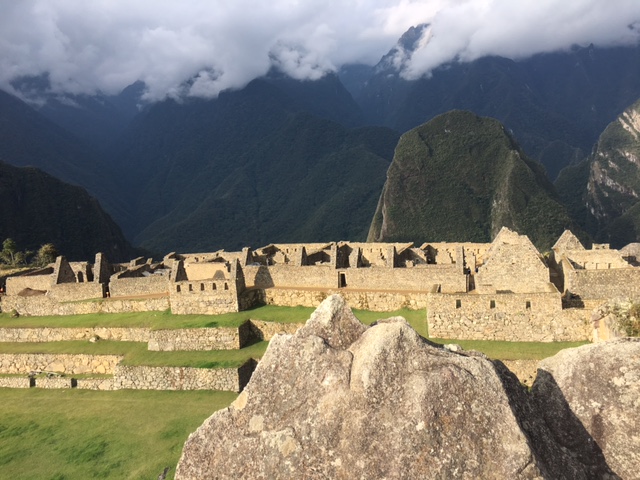
The setting in itself is so unbelievable — a ridge in the Andes between three dramatic peaks. The jungle creeps up on all sides (it’s easy to see how it was lost for so many centuries) and the clouds bear down on it, passing through it like ghosts. The Incas had a knack for selecting spectacular sites for their gravity-defying engineering projects — they were clearly not intimidated by impossibly steep slopes or the idea of moving stones the size of Volkswagens up them (without the use of wheels, mind you) — and, if I can read into their ambitions here, I would say that they wanted to make their indelible mark on a place where the mountains met the jungle in order to declare their dominion over both. But no one knows for sure. You look at this place wondering both how and why. Just as no one knows how the Incas cut their stones without steel, no one knows for sure the purpose of Machu Picchu. It’s partly these mysteries that give the site its allure, but there’s much more to it than that. Like every great ruin, it evokes tragedy along with romance: It represents the end of a civilization, the devastation of a nation, and every fallen structure is a reminder of how temporary our existences are. All these things were there for me that first afternoon when we arrived, when we first set eyes on it — the greatness, the sadness, the mystery.
Then came Aguas Calientes and a sleepless night.
“You want me to turn it down?!” The drunk man in the boxer shorts roars over the music.
Again, I beg shamelessly, raising my voice over the booming music. “Yes! Please!”
The man nods like a king granting a lordship. “Hokay,” he says. He turns his back to me and goes behind the unfinished walls of his apartment, haphazard with bricks. The music, miraculously, ceases. Heady with my accomplishment, I traipse down the stairs to our room.
“What happened?” Sarah speaks groggily, like someone coming out of a nightmare.
“Oh nothing,” I respond, slipping between the sheets. “I just asked him to turn it down and he did.” No sooner does my head hit the pillow, though, than the pounding beat resumes, louder than ever, this time accompanied by excited whistling.
While I will never know why the Incas built Machu Picchu, I think I understand why the drunk man in the boxer shorts hates me. After an evening in Aguas Calientes, a place that, through the necessities of geography, functions as a funnel to the most famous ruin in America, I hated me, too. There’s nothing worse than a town that’s devoted solely to tourism. It’s not just the high prices and the terrible food or the general lack of accountability, it’s the bifurcation of the town. Aguas Calientes contains two kinds of people: Tourists and locals working, directly or indirectly, to keep those tourists happy. There is no one else. And the tourists here are a constant, steady flow, mobbing bus stops and restaurants with their ugly clothes, terrible Spanish and selfie sticks — eating, drinking, sleeping and gone. If you’re a local here, you’re like a postal worker watching an endless stream of mail. Foreigners come here to see the ruined city on top of the hill and then get the hell out as fast as possible. And you owe them your living. You are paid to serve them, drive them, clean up after them. Why wouldn’t you want to occasionally torment them with your terrible polka music?
I awaken the desk clerk again and talk him into opening a vacant room on the other side of the hotel, where Sarah and the kids finally get to sleep in two twin beds. I lie in the noisy room awake for most of the night, sandwiching my head between pillows. I contemplate climbing to the roof again, but imagine a similar encounter followed by a similar outcome. The same Roadrunner-Coyote dynamic plays out, however, without my even having to leave the bed. Occasionally the music ceases and I slip quickly into unconsciousness, only for it to blare forth again, jarring me awake. In my fatigued, self-pitying state, I feel like I’m being tortured for the sins of all tourists.
The first tourist was an amateur archaeologist named Hiram Bingham III, the U.S. explorer who “discovered” Machu Picchu. Depending on what you read, he either stumbled upon the site with the help of local farmers or hacked it from the jungle with Yankee grit and determination. The quotes around discovered are as loaded with portent as everything associated with Machu Picchu. Some resent the idea of an American “discovering” a site that was known about by at least a dozen local Peruvians who, living day to day in an area filled with ruined Incan buildings, assumed that there was nothing special about these particular buildings. But when writing bestsellers about his “discovery,” Bingham conveniently left out the names of others who had come upon the site previously, explorers who lacked the sponsorship of National Geographic. And then there’s the matter of the 40,000 artifacts he took to the United States….
Of course, this narrative plays perfectly into the present day, when subsequent foreign tourists enter Peru every day by the thousands to set foot in the ruins, throwing large amounts of money at the Peruvians, who are generally less well off, for this privilege. It’s difficult to fathom the waves of tourists, the tremendous concentration of foreigners, who come from all over the world to stand on top of this particular ridge. Imagine that the United States had no Statue of Liberty or Grand Canyon or Golden Gate Bridge. Imagine that there’s a field in the wilderness of Arizona that’s the only thing that people from all over the world want to see in the United States. And then they want to get out. That’s Machu Picchu in Peru.
The next morning, we gather ourselves blearily and pick at the odd breakfast offered by our hotel: Pieces of fruit, hot water, instant coffee, hard rolls. Then it’s time to race to the bus stop, where tourists line up by the hundreds every morning starting at 3:30 a.m. to be hauled up the Hiram Bingham Highway (actually a narrow road of switchbacks) to Machu Picchu. The bus drivers who make this hair-raising journey countless times a day are among the unsung heroes of this place.
When we visited Machu Picchu the day before, at the end of the afternoon, I hadn’t appreciated how quiet it was among the stone buildings. Morning is the busy time at the ruins, as most tourists leave in the early afternoon to catch the train back to Cuzco and their departing flights. Everywhere we walk this morning we seem to be standing in the way of another tourist or their photo. Khaki-uniformed guards whistle at visitors climbing atop altars to get photos of themselves, grinning maniacally into their phones. In a small meadow near the top of the ruins, llamas graze while tourists walk beside them, craning their necks to get the perfect shot of themselves in the foreground with the llama and Machu Picchu in the background. The kids and I watch in disbelief as a French tourist grabs one llama by its neck to wrestle it into a photo opportunity. Many visitors, seemingly oblivious to their surroundings, bark loudly into their phones. “I won’t pay it!” an old woman shouts in Spanish outside of the Sun Temple. “I won’t pay it!”
Amid all of this, the morning clouds swirl in and out, and the ruins appear and disappear before us, as do its visitors, an eerie vanishing act that reminds me of how long they’ve been sitting on this ridge, oblivious to the centuries, oblivious to us. Before we too are due to leave to make our train, I find a few moments of relative quiet in the Casa del Inca, a beautiful building of seamlessly laid stones, the emperor’s residence when visiting Machu Picchu. There’s actually a pool where the Son of the Sun would bathe himself and a bathroom with the town’s only flushing toilet. I sit on a rock and try to imagine the emperor readying himself for a day of making sacrifices to the various deities that needed appeasement if life on Earth was to continue. The people who made this city believed in magic, and it’s undeniable that something of that magic is still here, for otherwise, why would so many of us go through so much to sit among its stones?
Just before leaving the station, on the train back to Cuzco, a recorded announcement plays in Spanish and English over the PA. It says, “We hope that your visit to Machu Picchu was as magical as you wanted it to be.” Well, yes. And no.
